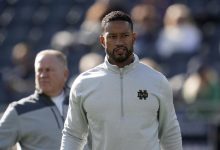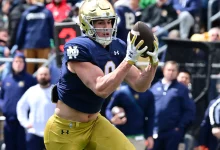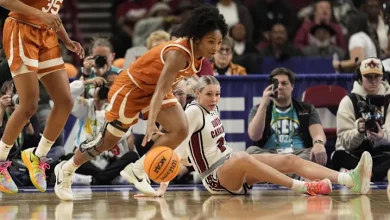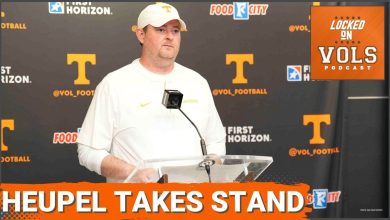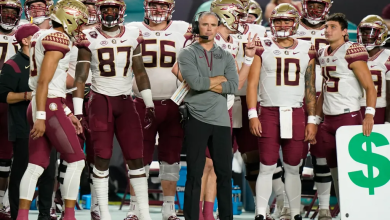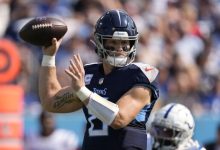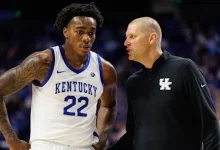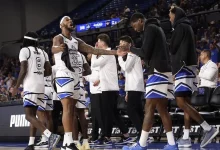CJ Carr’s Inexperience, Lingering Injuries, and Unreliable Pass Rush Raise Major Red Flags for Notre Dame Entering the 2025 Season
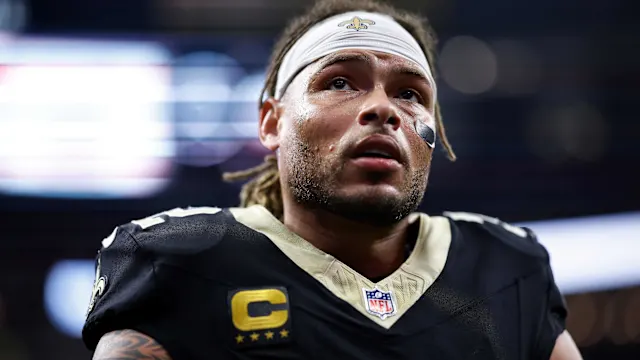
Notre Dame football enters the 2025 season with expectations as high as ever, but the Fighting Irish are battling a set of concerns that could derail their campaign before it ever truly begins. From questions at quarterback with CJ Carr still developing, to the continued injury woes plaguing the depth chart, and a pass rush that has yet to prove it can dominate elite competition—head coach Marcus Freeman’s program has serious challenges to address as fall camp looms.
While optimism surrounds the Irish’s top-10 recruiting class, high-profile returners, and an experienced coaching staff, the shortcomings in key areas—especially at quarterback and on the defensive front—could hold back a team many expected to be in the College Football Playoff conversation.
CJ Carr Isn’t Ready Yet—And That’s a Problem
CJ Carr, the former five-star recruit and grandson of Michigan legend Lloyd Carr, was heralded as the future of Notre Dame football when he committed. The Irish faithful hoped the Michigan native would be ready to lead the offense in his redshirt freshman season. But based on spring camp reports and feedback from inside the program, Carr simply isn’t ready to shoulder the responsibilities of a starting quarterback for a team with championship aspirations.
Despite flashes of talent—tight spirals, natural leadership, and a surprisingly quick release—Carr has struggled with decision-making under pressure and lacks the command of the offense that veteran quarterbacks typically bring. Coaches are trying to simplify the playbook for him, but that in itself is a warning sign. His footwork has shown improvement, but consistency remains elusive.
Veteran Steve Angeli, who saw limited action in 2024, could begin the season as the starter if Carr doesn’t show dramatic growth in August. However, Angeli is widely viewed as a game manager rather than a game-changer. That could limit Notre Dame’s offensive ceiling and create a frustrating cycle where the Irish can’t stretch the field or capitalize on their athletic weapons.
The offense has the pieces—tight end Mitchell Evans, speedy wideouts like Jaden Greathouse and Jordan Faison, and a solid offensive line. But without a confident, capable quarterback, all of those advantages may be wasted. Notre Dame has shown what it looks like with elite quarterback play (see: Sam Hartman’s impact in 2023), and the drop-off could be stark.
The Injury Bug Is Still Biting
Notre Dame’s health issues aren’t just bad luck—they’re a trend that’s persisted over the last few seasons. And once again, the injury report is filled with names the Irish can’t afford to lose.
Linebacker Jaylen Sneed, cornerback Benjamin Morrison, and offensive lineman Blake Fisher are all dealing with varying levels of injury concerns heading into fall camp. While none are expected to miss the entire season, the lingering effects of these issues could impact their availability and performance.
The defensive secondary is especially vulnerable. Morrison is arguably the best player on the defense, a potential first-round NFL draft pick who locks down elite wide receivers. If he’s not at 100%, it places additional strain on an already thin secondary.
Meanwhile, the offensive line, long considered a strength for Notre Dame, could be in trouble if Fisher’s recovery isn’t complete. The depth behind the starters is unproven, and a shaky offensive line only compounds the issues at quarterback.
Freeman and his staff brought in new strength and conditioning protocols this offseason, hoping to reduce soft tissue injuries and improve recovery timelines. But early returns haven’t been encouraging. Until this team can stay healthy, the question won’t be whether Notre Dame has talent—it’ll be whether that talent is available when it matters most.
Defensive Line Must Do More Than “Just Enough”
Notre Dame’s defense was solid in 2024 but lacked a true game-wrecking edge rusher. That void remains entering 2025. The Irish need someone—anyone—to consistently pressure the quarterback and force offenses into mistakes.
Last season, Javontae Jean-Baptiste led the team with 5.5 sacks, but he’s gone. Jordan Botelho was expected to be the next disruptive presence off the edge, but injuries and inconsistency have limited his effectiveness. Tyson Ford and Boubacar Traore are names to watch, but they’ve yet to put together full seasons of production.
New defensive coordinator Al Golden has emphasized aggressive fronts and pressure schemes this offseason, but execution is the real issue. Without a player who commands double-teams or threatens to ruin game plans, opposing quarterbacks are far too comfortable. Against teams like USC, Alabama, or Ohio State, that’s a recipe for disaster.
There’s hope that highly touted freshman edge rusher Bryce Young Jr. (no relation to the Alabama quarterback) can develop into that role quickly, but relying on a true freshman to save the pass rush is a risky proposition. Until proven otherwise, the lack of a dominant pass rusher remains a glaring weakness.
Special Teams, Depth, and Mental Toughness
It’s not just quarterback, injuries, and pass rush—the smaller details are concerning too. Special teams cost Notre Dame key field position several times last season. Kicker Spencer Shrader is gone, and his replacement remains undecided. That’s a critical position for a team likely to be in close games.
Depth across the board, especially at wide receiver and in the defensive backfield, is another concern. Notre Dame has frontline starters who can compete with anyone, but injuries or fatigue could expose a thin second unit.
Then there’s the mental side. Marcus Freeman is entering his fourth season as head coach and has yet to guide the Irish to a College Football Playoff berth. While he’s brought energy and elite recruiting to the program, some critics wonder if his teams have the mental toughness and killer instinct required to win the big games.
Losses to Ohio State, Clemson, and Louisville in 2024 all featured second-half breakdowns and questionable adjustments. Freeman must prove he can get this team over the hump—not just in talent, but in execution and mindset.
What Must Go Right
For Notre Dame to reach its lofty 2025 goals, a few things must break their way:
-
CJ Carr Must Take a Leap: Whether or not he starts Week 1, Carr has to become a viable starting quarterback by midseason. The Irish can’t compete for a playoff spot without him developing into the player his high school film promised.
-
Health Must Improve: Starters like Morrison, Sneed, Fisher, and Evans need to stay healthy. Depth isn’t where it needs to be, and another injury-plagued season would be devastating.
-
A Pass Rusher Must Emerge: Someone has to fill the void. Whether it’s Botelho, Ford, or a freshman, Notre Dame needs a consistent edge threat.
-
Strong Start to the Season: The early schedule isn’t brutal, but the Irish can’t afford a slow start. Momentum will be critical to building confidence and helping Carr settle in.
-
Win a Big Game: Notre Dame’s schedule includes high-profile matchups against Alabama, Florida State, and USC. Winning at least one—preferably two—would keep them in the CFP conversation and establish legitimacy.
There’s no denying that Notre Dame is trending in the right direction under Marcus Freeman. Recruiting is at an elite level, the culture is strong, and the foundation is solid. But until the Irish find answers at quarterback, get healthy, and build a pass rush that can disrupt elite offenses, they’ll remain on the outside looking in when it comes to national championship contention.
Freeman has the belief of the fanbase and the talent in the locker room. Now, he must find a way to navigate the landmines that lie ahead in 2025. If Carr matures quickly, the defense finds its edge, and the injuries subside, Notre Dame could be special. But if those issues persist, it’ll be another year of “almost” in South Bend.

